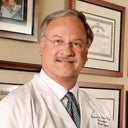At the time your photos were taken, you showed very little post-op swelling, virtually no bruising, and good implant position (important for textured implants, which cannot be expected to drop, soften, and settle like smooth round implants). All of this is good, indicative of excellent surgery, and usually predictive of superior outcomes.By now you already know that much of your surgical swelling has gone down, and since your implants neither swell nor go down in size, your present size is very close to what you can expect long term.For other readers, surgical swelling reaches its peak 3-5 days after surgery, and then starts to diminish over many months, with the most rapid changes in the first few weeks. Of course, menstrual cycles, salt intake, and other factors can influence the degree of swelling in individual patients. Of even more significance is the technical skill and tissue handling precision of your surgeon.Careful dissection, precise hemostasis, and delicate tissue handling are hallmarks of excellent surgical technique, and I believe this is an integral part of good surgical outcomes. Blunt dissection, lots of bruising and swelling, use of surgical drains, Ace bandages, or surgical bras may indicate less gentle surgical technique, and can be associated with higher risk of capsular contracture, hematoma requiring re-operation, and less ideal outcomes.To be fair, surgeons who are in the latter category are not willfully chancing your results; they simply were trained that way, have not seen the benefits of spending a tiny bit more time and care in the operating room, and are generally accepting of whatever outcomes (still usually satisfactory) they achieve.Those of us who have adopted more careful and precise surgical techniques have seen reduction of complications, improved outcomes, reduced re-operations, and happier patients. Some of these enlightened surgeons have even suggested that their techniques are worthy of "special names" to imply they are the only plastic surgeons capable of "overnight recovery," "Flash recovery," or "Super-duper heal in one weekend breast augmentation." (Well, not really the latter, but you know what I mean.) Remember, there is nothing special or proprietary about good surgical technique, and physiologic healing takes the same time for all patients in good health and nutrition states. Yet, knowing your surgeon takes the care and time to "do it right" rather than regarding your surgery as "Yawn, just another boob job" is a vital thing to know, especially before you choose your surgeon.It certainly appears as if your surgeon is in the "takes good care" group. You should see very little change from what you see now in terms of size, just improved softness and more sensation return as you heal and your scars fade. Congratulations to you, AND your surgeon! Cheers! Dr. Tholen










